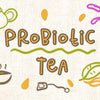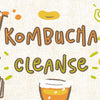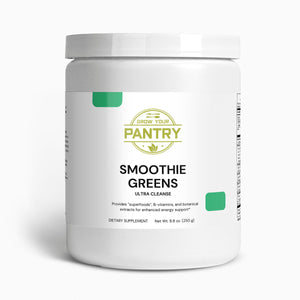Kombucha vs Apple Cider Vinegar
Apple cider vinegar has endless benefits due to its nutritional composition making it our preferred option. However, when it comes to fermented drinks popularity, kombucha holds the top spot.
Not Much Time? Skip To What You'd Like To Learn...
-
What Is Kombucha?
-
What Is Apple Cider Vinegar (ACV)?
-
Making: Kombucha vs. ACV
-
Health Benefits: Kombucha vs. ACV
-
Healthier: Kombucha vs. ACV
-
Differences: Kombucha vs. ACV
-
Flavor: Kombucha vs. ACV
-
Risks: Kombucha vs. ACV
-
ACV and Kombucha Cross-Contamination
-
Considerations Before Buying Kombucha
-
Considerations Before Buying ACV
-
FAQs
What Is Kombucha?

Kombucha is one of the most ancient brews with historical evidence of brewing in China more than 2000 years ago. This drink starts as sugary freshly brewed tea and undergoes a 7 to 14 day aerobic fermentation cycle. It uses a kombucha symbiotic culture of bacteria and yeast (SCOBY) and starter tea from a previous brew to introduce the bacteria and yeast culture responsible for the fermentation process.
The process starts with the yeast culture feeding on the dissolved sugar and tea extracts to release ethanol. The ethanol is then broken down by the bacteria culture and thus produces carbon dioxide, which gives the drink some effervescence.
Kombucha can be taken through a second ferment process to flavor it; in this case, the raw kombucha is mixed with the flavoring ingredient and bottled airtight. This encourages anaerobic fermentation in the absence of oxygen and prevents the carbon dioxide from escaping making the drink fizzier.
Here at Grow You Pantry we grow our own SCOBYs! If you're interested in SCOBYs, or other kombucha accessories check out Our Store for the latest price.
What Is Apple Cider Vinegar (ACV)?

ACV refers to fermented apple juice with added cider yeast. During the fermentation process, the yeast turns the sugar in the juice into alcohol. The bacteria culture, in turn, converts the alcohol into acetic acid and carbon dioxide. The acid gives apple cider vinegar its characteristic strong smell and sour flavor.
Making: Kombucha vs. ACV

While both of these drinks rely on fermentation, the setup is somewhat different as each brew does have its own requirements.
Kombucha
Preparation Time: 45 minutes
Ingredients: Sugar, tea leaves, starter culture, and water
Brewing Time: 7 to 14 days
Difficulty: Relatively easy
Cost: The initial cost of acquiring the necessary fermentation tools might be somewhat pricey, especially if you are investing in high quality glassware.
Kombucha brewing starts with freshly brewed and sweetened tea before introducing the yeast and bacteria culture in the form of previously brewed kombucha (starter tea) and a SCOBY. The brew time ranges from 7 to 14 days, depending on the specific recipe and your taste preferences. Whereby fermenting for longer gives the kombucha tea a tarter flavor with reduced sugar as most of it gets broken down by the culture.
Apple Cider Vinegar
Preparation Time: 1 hour
Ingredients: Fresh apples, sugar, and water
Brewing Time: 40- 45 days
Difficulty: More labor intensive, the apples require being chopped before fermentation and the mix needs to be stirred regularly.
Cost: The cost will vary depending on the availability of the fresh apple fruits.
Making ACV is very similar to kombucha, start with either fresh apples finely chopped or apple scraps. The apples should then be placed in a jar with sugar water and left to ferment for around 3 weeks. Then the apples should be removed and the mix left to ferment for a further 3 - 6 weeks, depending on personal taste.
Health Benefits: Kombucha vs. ACV

Apple Cider Vinegar
Rich Source Of Acetic Acid
ACV contains up to 6% acetic acid, which is classified as a weak acid as it has an alkaline effect on the body such as dissolving the calcium found in plaques which clog arteries. This acid also plays a critical role in lowering blood pressure, reducing inflammation as well as preventing sugar spikes (link).
Lowers Blood Sugar
It has been shown to increase insulin sensitivity in patients with insulin resistance or type 2 diabetes. Consuming ACV before bedtime can reduce blood sugar in the morning as well as improve insulin function after meals (link).
Aids Weight Loss
It has been shown to bring about satiety, which helps in reducing the number of calories consumed and hence supporting weight loss. When it comes to dealing with obesity, research shows that the consumption of ACV on a daily basis led to the reduction of belly fat as well as faster weight loss (link).
Improves Heart Health and Lowers Cholesterol
Current research has shown that it can lower cholesterol as well as triglyceride; these are the riskiest when high as they increase the risk factor for kidney problems and heart disease. The reduction of these chemicals also leads to reduced blood pressure, which is another factor that increases the chances of developing heart disease (link).
May Protect Against Cancer
Numerous studies on the anti-cancer effects of fermented apple cider vinegar have shown that the brew can kill individual cancer cells and potentially shrink tumors. Observational studies have shown that consumption of vinegar can have a direct link to decreased esophageal cancer (link).
Kombucha
Healthy Source Of Probiotics
Kombucha tea contains a symbiotic culture of yeast and bacteria cells in their billions. Lactic-acid bacteria have been shown to have probiotic functionality in helping the good bacteria control the gut bio. Probiotics can also improve digestion and reduce inflammation (link).
Contains Polyphenols and Antioxidants
The infusion process transfers the antioxidants and vitamins found in various tea varieties into the brew. When using green tea, which is considered to be one of the healthiest beverages, you can expect to benefit from its bioactive compounds, e.g. polyphenols, with its antioxidant properties. Green’s tea’s weight loss properties are also passed on to the final brew (link).
Antibacterial
Kombucha contains acetic acid from the breakdown of alcohol by the aerobic bacteria culture and polyphenols from the tea leaves. These compounds have strong antibacterial properties that help fight off harmful bacteria in the gut (link).
Reduce The Risk Of Heart Disease
Kombucha has been shown to significantly improve two markers of heart disease. These are LDL and good HDL cholesterol. Kombucha tea has such a substantial impact on the cholesterol levels that, in as few as 30 days, the drink can improve cholesterol levels (link).
May Help Manage Type 2 Diabetes
Research has shown that kombucha has a direct impact on the digestion of carbs by slowing down the process, thus reducing the blood sugar levels which helps type 2 diabetes patients better manage the condition. Kombucha prepared using green tea also contains the healing properties of green tea which lowers the risk of becoming diabetic by 18%. However, if you do suffer with diabetes, contact a medical professional before consuming (link).
May Help Fight Cancer
Research on the growth of cancer cells and how they spread have shown that the drink does reduce the rate due to its considerable concentration of polyphenols and antioxidants from the tea. Polyphenols have been shown to block gene mutation as well as reduce the growth rate of cancer cells (link).
Healthier: Kombucha vs. ACV

While both of these drinks have their own unique health benefits, apple cider vinegar holds the upper hand. This is due to its much more substantial nutritional content per serving.
Nutrient |
ACV per 8 oz serving |
Kombucha per 8oz serving |
Calories |
51 |
15 |
Sodium |
12 mg |
0 |
Potassium |
174.5 mg |
0 |
Sugar |
1 g |
3g |
Calcium |
1% daily value |
0 |
Magnesium |
3% daily value |
0 |
Iron |
2% daily value |
0 |
Caffeine |
0 |
10-16mg |
Alcohol |
0 |
0.5-1.5% |
Differences: Kombucha vs. ACV

Factor |
Kombucha |
ACV |
Taste |
Sweet with a hint of tartness |
Characteristic sour taste |
Ease of making |
Fairly easy |
Can be quite complex as it involves numerous steps over a prolonged period of time |
Price |
Relatively affordable as most of the ingredients are locally available |
The season will affect the price will depend on the availability of apples |
Accessibility |
There are a lot of brands selling bottled kombucha as it’s one of the most common fermented drinks |
Readily available in stores thanks to the numerous large-scale brewers who deal with the drink |
Ferment time |
7- 14 days |
40- 45 days |
Flavor: Kombucha vs. ACV

ACV - This has an unpleasant taste and strong vinegar flavor. This results from the breakdown of alcohol into acetic acid by the bacteria culture. As a result, the drink can be quite bitter for some to drink directly.
To improve the flavor of apple cider vinegar without compromising its low sugar level, you can dillute with water. Alternatively, you can spice the brew with cinnamon and stevia.
Kombucha - This has a mildly sour flavor, which is often overpowered by its sweetness. The drink gets its sweetness from the left-over sugar that the yeast culture may not have broken down during fermentation.
The mild sourness is a result of the fermentation process whereby the alcohol produced is broken down into carbon dioxide and acetic acid, although in much lower quantities compared to ACV.
Kombucha can also undergo a second ferment to infuse it with another flavor. This can be accomplished by anaerobically fermenting the raw kombucha and the flavoring ingredient.
Risks: Kombucha vs. ACV
ACV
Gastroparesis Patients
Gastroparesis refers to a medical condition that results in delayed gastric emptying. It stops or slows down the movement of food from the stomach to the small intestine even though there’s no blockage in the intestines or stomach.
ACV reduces the rate at which the process of food movement from the stomach to the small intestine. As a result, the brew can worsen the condition in gastroparesis patients. This results in symptoms such as bloating, heartburn, and nausea (link).
Brittle Bone Disease Patients
Brittle bone disease is a health condition that results in fragile bones that often break easily. While it’s mostly found in children, the condition can lead to imperfectly formed bones even in adulthood. ACV is considered a weak acid, but that doesn’t stop its acidity from leaching calcium and potassium. This can worsen the disease (link).
Tooth Enamel Erosion
If you have had a previous encounter with tooth enamel erosion, then it’s recommended to avoid ACV as it considered quite acidic and can erode the surface of your teeth. To stay safe from such side effects, you should rinse your mouth with fresh water after drinking to reduce the acidity that’s left behind (link).
Diabetes Medication
ACV may interfere with insulin and insulin stimulating medicines, which are used by type 1 diabetes patients. This results in a condition whereby the patient experiences low potassium levels and dangerously low blood sugar. If you are on diabetic medication ensure that you consult your doctor before consuming apple cider vinegar (link).
Digoxin (Lanoxin)
Digoxin is a prescription drug that’s used to lower blood potassium levels. Avoid taking apple cider vinegar if you are on digoxin medication or any other diuretic medication, as this might lead to extremely low levels of potassium, which can be fatal (link).
Pregnancy
Due to the fact that pregnant women have a weakened immune system, it's advisable to avoid any unpasteurized foods. If ACV is pasteurized, the drink effectively eliminates all the helpful probiotic benefits, thus making it entirely useless to drink it if it’s been heat treated.
Kombucha
Pregnancy
Kombucha contains alcohol and caffeine as well as live yeast and bacteria culture. Therefore it is best to avoid the drink when pregnant or breastfeeding. Both caffeine and alcohol have adverse effects on the developing baby and should, therefore, be avoided as they can cross over either via the placenta or via breast milk while breastfeeding.
The live yeast and bacteria culture can also cause infections as pregnancy does weaken the immune system. To stay on the safe side, you should avoid all kombucha, as the pasteurized version simply lacks any health benefits.
Abdominal Issues
Kombucha contains carbon dioxide, which gets dissolved as it’s produced by the bacteria culture as it breaks down the alcohol produced by the yeast culture. This gas can cause abdominal discomforts such as bloating and stomach upset as the excessive gas in the drink builds up in the stomach.
To avoid such complications, start off with a small amount of the brew such as 2 oz before gradually increasing the volume as your body gets more acclimatized.
Weakened Immune System
HIV and AIDS patients have compromised immune systems that are more prone to bacterial infections. Therefore, they should avoid kombucha as it contains live yeast and bacteria culture, which might cause infection more easily.
Chemotherapy patients, as well as those on immunosuppressants, should also avoid raw kombucha as their immunity is compromised to a certain extent.
ACV and Kombucha Cross-Contamination

ACV and kombucha rely on yeast and bacteria culture for the individual fermentation processes. While these might seem like they are all the same, they are, in fact, different species of yeast and bacteria culture in each.
When cross-contamination occurs, a foreign culture gets introduced which leads to the breakdown of the symbiotic balance between the cultures. This can lead to rot and growth of mold on the individual cultures and contamination of the brews.
How can kombucha and apple cider vinegar cross-contamination happen?
-
Handling different fermenting projects with unclean hands especially when mixing or crushing the ingredients.
-
Using non-sterilized utensils and fermentation jars which had been used on a previous brew.
-
Storing fermenting cultures and projects too close together can result in cross-contamination via airborne transfer of spores.
-
Storing fermenting brews near ambient sources of bacteria such as washrooms.
Considerations Before Buying Kombucha

Alcohol Content
Raw kombucha contains small amounts of alcohol usually not more than 0.5%. After it’s bottled the culture feeds on the remaining sugar to release more alcohol, which drives the concentration up to about 1.5% to 6% depending on the brewer’s preferences.
Caffeine Content
Different teas produce varying amounts of caffeine. After the fermentation process, about 1/3 of the original caffeine will still remain in the final brew.
Tea variety |
Caffeine before fermentation per 8 oz serving |
Caffeine after fermentation per 8 oz serving |
Black tea |
40-70 mg |
17-25 mg |
Green tea |
35-45 mg |
15-30 mg |
White tea |
15-30 mg |
5-10 mg |
Oolong tea |
37-55 mg |
16-22 mg |
Rooibos tea |
0 mg |
0 mg |
Price
Always go for raw kombucha as it's not only cheaper but also contains natural probiotics. Pasteurized varieties are also not worth the cost as they lack a natural probiotic culture.
Sugar Content
Raw kombucha should have less than 5g of sugar per 8 oz serving, making it a healthy low sugar alternative brew. On the other hand, flavored brands often have added sugar, which might not be healthy if you are trying to lose weight.
Considerations Before Buying ACV

pH level
Apple cider vinegar has a pH of 2.5 to 3 which is considered slightly acidic. This score is determined by the concentration of acetic acid in the brew. Consider getting ACV varieties with a low pH score as they are more acidic and therefore contain a higher concentration of acetic acid.
Type Of Apples Used
Various apple varieties produce varying taste notes in the final brew. Consider getting a blend of apples which best suit your flavor preferences.
Raw Materials Used
Before buying any product look through the list of ingredients and avoid any that include artificial sweeteners and colors as this is a common indication that even the primary ingredients may not have been up to standard.
FAQs

Can I drink kombucha vinegar?
Yes, but the taste is very tart and might be too sour. In such a case use it for general cleaning as a bleaching agent. Check out our full article on Kombucha Vinegar for more information.
Can I use apple cider vinegar in my kombucha?
No, the two brews contain different yeast and bacteria cultures and cannot be used alternately as a starter for the other.
What is the difference between kombucha and vinegar?
Kombucha has a lower acetic acid content as most of the alcohol breakdown occurs aerobically; thus, most are broken down into carbon dioxide. Vinegar has a high concentration of acetic acid due to the fact that alcohol breakdown is restricted to anaerobic breakdown thus resulting in more acetic acid.
Is kombucha good for kidney disease?
Kombucha brewed using green tea has been shown to reduce blood sugar levels and improve kidney function.
How much kombucha should I drink daily?
The Center for Disease Control has a daily kombucha recommendation of up to 4 oz per serving up to 3 times per day.








